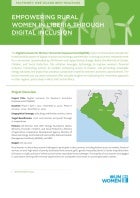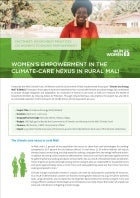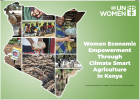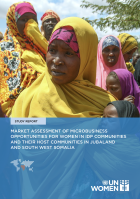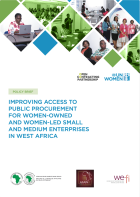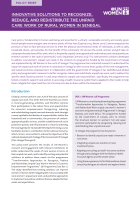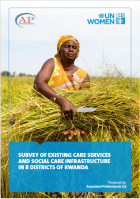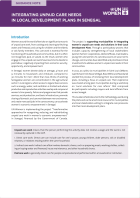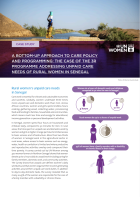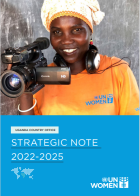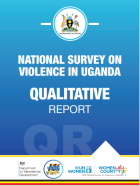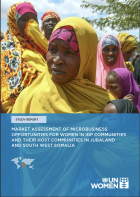1 - 20 of 24 Results
Pagination
Date:
This publication is part of the WEE WCARO Best Practices series. The Digital Inclusion for Women’s Economic Empowerment (D4WEE) project in Liberia demonstrates the transformative power of digital inclusion and strategic partnerships in driving economic empowerment for rural women. Rural women face challenges to participate in the economy, including limited access to markets, financial services, or land. By connecting women to markets, enhancing access to finance, and promoting renewable energy solutions, the project leverages technology to improve women’s financial inclusion.
Date:
This publication is part of the WEE WCARO Best Practices series. The ‘‘Climate and Energy Mali” (CEMALI) project trained women in the production of improved cookstoves and sustainable fuels, reforestation activities, forestry management, and improved and efficient carbonization techniques. The project has contributed to climate change mitigation and adaptation, a reduction of women’s unpaid care work, and improved health of household members. This factsheets outlines the project's approach and results.
Date:
The UN Women Kenya Annual Report highlights key achievements in advancing women’s empowerment and gender equality.
This report showcases progress in increasing women’s leadership and political participation, strengthening economic empowerment, eliminating violence against women and girls, engaging women in peace and security efforts, and enhancing planning and coordination.
UN Women Kenya remains dedicated to building a future where women are at the heart of developing resilient and sustainable communities.
Date:
The WEE-CSA Storybook showcases the success stories of over 2,400 women from Kitui, Laikipia, and West Pokot who have transformed their lives through climate-smart agriculture. Funded by KOICA and implemented by UN Women Kenya, it highlights the project's impact on livelihoods and gender equality while sharing valuable lessons learned. This collection celebrates resilience and aims to inspire further community upliftment for sustainable development in Kenya.
Date:
Explore the strides made in empowering women entrepreneurs in West Africa through the Affirmative Procurement project. These fact sheets provide an in-depth look into progress made in Côte d’Ivoire, Mali, Nigeria, and Senegal highlighting initiatives aimed at supporting Women-owned/led Small and Medium Enterprises (WSMEs) within the procurement landscape.
Date:
Discover the impact of the Affirmative Procurement Reform in West Africa project in empowering women entrepreneurs across Côte d’Ivoire, Mali, Nigeria, and Senegal. This newsletter showcases policy reforms, capacity-building initiatives, and success stories aimed at enhancing women's participation in procurement.
Date:
This advocacy notes outlines the most recent data on women's access to finance in Africa and indicates what policymakers, civil soiety organisation and financial institutions can do to improve women entrepreneurs' situation in accessing green finance.
Date:
The publication aims to understand the current landscape of microbusiness in terms of the opportunities, barriers and challenges that women in displacement settings face in accessing economic opportunities in the cities of Kismayo, Dollow and Baidoa
Date:
Women own 30 per cent of the small and medium businesses worldwide, yet women-owned businesses only access 1 per cent of all procurement contracts suggesting systemic gender disparities within procurement systems. This policy brief analyses the extent to and ways in which regional institutions in West Africa could adopt better policies for gender-responsive procurement.
Date:
This infographic is based on the results of an assessment of rural women's needs, carried out as part of UN Women's 3R Program in Senegal. It illustrates the challenges of unpaid care work faced by rural women, as well as innovative solutions and policy measures to address these needs, and to recognize, reduce and redistribute rural women's unpaid care work.
Date:
This policy note presents the results of the assessment of the needs of rural women, carried out as part of the 3R Programme in Senegal, and namely the unpaid-care work related needs faced by rural women, along with the innovative solutions and policy measures needed to address these needs and recognize, reduce, and redistribute rural women's unpaid care work.
Date:
The likelihood of "economic disempowerment" is increased due to the unequal load of unpaid care duties placed on women and the human development outcomes of both the women and those being cared for may be impacted because women in the paid labor market may not be able to adequately fill their caregiving duties (Deepta & Zambelli,2017).
Date:
In Senegal, UN Women is supporting municipalities in integrating women’s unpaid care needs and solutions in their Local Development Plans. UN Women developed a methodology for identifying and analysing community care needs and for developing and financing solutions to those needs. This Guidance Note documents the methodology and can be a technical resource for municipalities and local stakeholders willing to integrate care provisions into their local development plans.
Date:
In Senegal, UN Women's 3R programme has focused on: research to identify unpaid care needs of women in rural areas; integrating unpaid care solutions in local investment plans; adapting and scaling up health insurance solutions through policy dialogue with the National Health Insurance Agency and the private sector; and using these experiences to facilitate evidence-based care policy dialogues. This case study discusses the program's experience and results.
Date:
The policy brief aims to serve as an synthesizes and presents key findings from UN Women-led research; regional online surveys and; advocacy on. making the AfCFTA work for (young) women and (young) women-led businesses, both in the design and implementation of gender-responsive AfCFTA policy reforms and complementary measures, as well as in the soon-to-be negotiated AfCFTA Protocol on Women and Youth in Trade.
Date:
Uganda has made gains in its socio-economic transformation, maintained peace and stability for over 3-decades and is on course to become an upper middle-income country by 2040. The Government of Uganda (GoU) is committed to the SDG 2030 Agenda as exemplified by the gross domestic product which doubled over the last 10-years, from $17.2 billion in 2010 to $34.4 billion in 2019. Literacy rates improved from 70% between 2012-2013 to 74% between 2016-2017, yet still literacy levels were higher for males than females. Uganda’s National Development Plan (NDP) III focuses on inclusive growth, human wellbeing and resilience, transformational and inclusive governance positions. The NDPIII is a convergence framework for the entire UN System to coherently contribute to the advancement of Gender Equality and Women’s Empowerment (GEWE) in Uganda with UN Women as a strategic partner on the path to transformation
Date:
The qualitative component of the Women’s Health and Life Experiences study was designed to complement the larger survey on prevalence which seeks to generate reliable estimates of the prevalence of different forms of Violence Against Women and girls (VAWG), provide detailed information on the impacts of VAWG, and examine women’s attitudes to violence, how women cope with violence, and the risk factors associated with VAWG. It provides contextual information on women and community perspectives and experiences of Violence against women and girls (VAWG).
Date:
Empowering women in the economy and closing gender gaps in the workspace is key to achieving the 2030 Agenda for Sustainable Development and achieving the Sustainable Development Goals in Somalia. The host community landowners and IDP casual laborers can jointly build their skills in climate-smart agriculture that can benefit the productivity of farms whilst also building the knowledge and skill set of IDPs.
Date:
UN Women amplified women’s role in the COVID-19 response highlighting the significant leadership roles women played in leading the response efforts in materials on COVID-19 prevention disseminated in local languages and hand washing facilities were constructed in 6 elementary schools. 528 returnee migrant women workers from the Middle East and domestic workers across Addis Ababa have been provided with basic sanitation and hygiene training and raising awareness on the disproportionate impact of COVID-19 on women, girls, and vulnerable and marginalized groups.
Date:
The African Continental Free Trade Area (AfCFTA) an opportunity for growth and prosperity in Africa. However, because of pre-existing inequalities in African economies, the agreement’s benefits will not be distributed equally along gender lines. As the AfCFTA Secretariat is starting to draft a Women in Trade Protocol, it is important that women across the continent participate actively in the process to voice their views, interests, and needs. This advocacy brief highlights 9 important...

